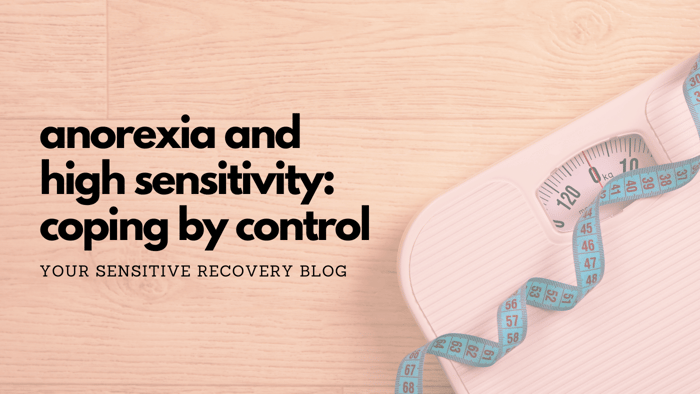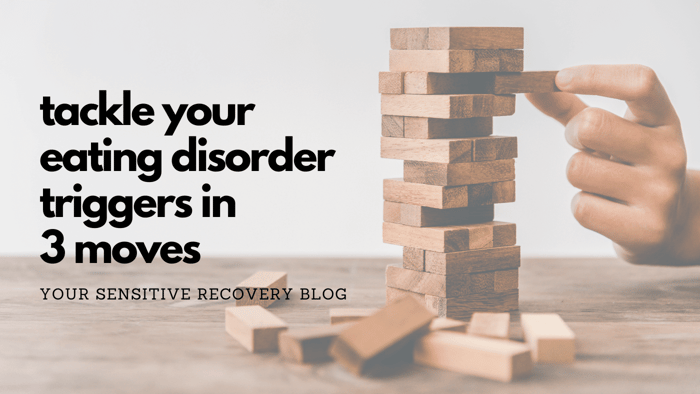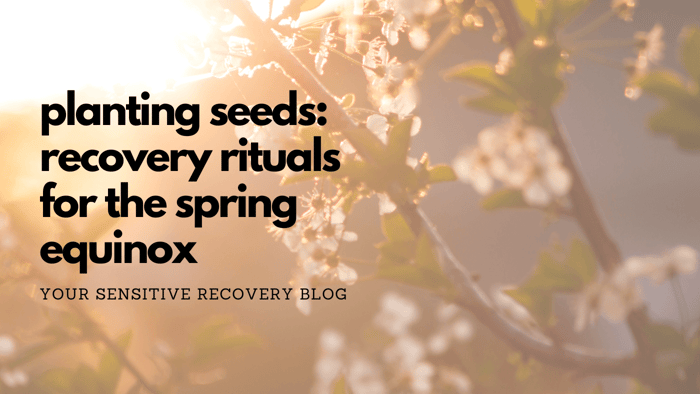Being a Highly Sensitive Person (HSP) means your brain is wired to navigate the world in a beautiful and unique way. Many gifts come with this trait, but it can also create some challenges - including an increased risk of developing an eating disorder.
The presentation spectrum of food and body image struggles is extensive, just like the myriad of ways that High Sensitivity presents. Both are unique to the individual but do often show up in a variety of characteristic and behavioral clusters.
While High Sensitivity is a biological trait (Sensory Processing Sensitivity is the scientific name), it is not a diagnosis like an eating disorder. As the name suggests, EDs are multifaceted disorders. You can heal from an eating disorder, but your sensitivity is with you for life. You ARE Highly Sensitive. You have anorexia, bulimia, binge eating disorder, etc.
Becoming familiar with High Sensitivity and how to work with your trait is imperative for HSPs.
When I was living with an eating disorder, I didn't know what Sensory Processing Sensitivity was, or that I, myself am a Highly Sensitive Person. As a therapist, I've specialized in treating food and body image struggles for many years, and I've come to find that many (if not most) of my clients are HSPs too.
Through my work, I've identified 5 reasons why Highly Sensitive People have an increased risk of eating disorders and disordered eating.
1: Sensation Sensitivity
One of the main characteristics of an HSP is a sensitivity to what others find subtle. Sensory information is processed very deeply in the brain and sensations are often felt to a greater degree. While not all EDs include a disturbance in body image, many do, and this is often heightened in Highly Sensitive People. Subtle changes in body weight or shape may feel intense, which exacerbates disordered thoughts and beliefs.
This sensitivity to sensation also shows up around food. The sensory experiences of eating and the felt sense of hunger and fullness can be quite different and even extreme for HSPs. For example, some textures or smells may be challenging or off-putting, or a shift from a little full to uncomfortably full can happen in seconds.
2: Harm Avoidance
As a temperament trait, harm avoidance may present as chronic worry and doubt, a reluctance to participate in the unfamiliar, and feeling easily fatigued. Studies have shown that the propensity toward avoiding harm is higher in those who develop disordered eating.
Harm avoidance that presents as self-doubt is particularly common among HSPs as their experience in the world has usually been invalidated on countless occasions by statements like, "You're just being too sensitive," or, "It's all in your head."
Highly Sensitive children grow up with this sort of invalidation, even in stable, loving families. It makes sense that we would begin to doubt our own internal cues.
3: Isolation and Secrecy
Not all Highly Sensitive People are isolative introverts, by any means. It's estimated that about 30% of HSPs are extroverts. But what is typically common across the spectrum of sensitivity is the deep need and tendency to withdraw from stimulation for the purpose of sensory rest.
This is normal. However, this healthy alone time may lend itself to the withdrawal an eating disorder desires.
Eating disorders thrive in isolation and secrecy. When there is a sense of separation and aloneness, a person leans harder on their disordered behaviors, in a way, for a kind of companionship. It is not uncommon for those struggling to feel the conflicting desires to rid themselves of the eating disorder and protect it at all costs.
4: Perfectionism and Comparison
Perfectionism is very common among people with food and body image struggles. This is not always obvious, however, because it can be solely self-oriented, meaning the perfectionist only holds themselves to impossibly high standards, and not others.
Because of the aforementioned Harm Avoidance trait, Highly Sensitive People may mistakenly turn to perfectionism as a protective tactic.
We can believe (on some level) that we might prevent uncomfortable experiences or bad things from happening with the never-ending pursuit of perfection.
Being keenly aware of our environment and the people in it, this tendency toward perfectionism means we're also prone to comparison. Many disordered eating symptoms circle around and our perpetuated by the devasting compulsion of comparing the self to others.
5: Need for Distraction and Relief
HSPs don't have it easy in this world. We just don't. Especially in Western culture, sensitivity is still seen primarily as a liability - something to be hidden or squashed out of someone. But even when you're in an optimum environment for your sensitivity, it's still tiring to process things so deeply. Wonderful, but tiring.
Enter, an eating disorder. They have a remarkable way of blocking out all else and becoming a person's sole focus. Life is whittled down to the pursuit of the ED's desires.
As a survivor, I don't doubt that every single person with an eating disorder history has or had one for very valid reasons. They are coping mechanisms, after all. And they work...until they don't.
Eating disorders are survival techniques that ensnare and baffle. They provide relief and solace but foster challenges and despair at the same time.
Full recovery is possible.
You do not need to become less sensitive to heal. That's a relief, right?
While it's true that High Sensitivity increases your risk of developing an eating disorder, it also gives you the gifts to fully recover from one.
If you need help navigating recovery as a Highly Sensitive Person, join my weekly newsletter for a burst of hope and inspiration and get my 5 Essential Tips for HSPs in Recovery.
You don't have to go through recovery alone. You were never meant to. 💕
✨ Josie Munroe, LMFT is a licensed therapist and owner of JosieMunroe.com and Your Sensitive Recovery As a recovered clinician and Highly Sensitive Person, she loves supporting others on their journeys to form new, empowered relationships with food, their bodies, and their sensitivity. Join the newsletter for a weekly boost of hope and inspiration. You deserve a recovery that works for you! ✨





